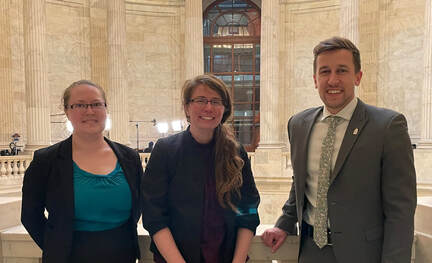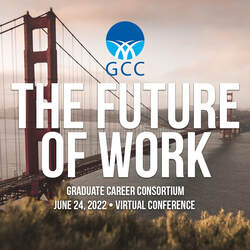|
Pictured from left to right is Tamara Savage, Ashley Orr, and Ben Ashman (AAAS Fellow with Sen. Sherrod Brown, OH) at the Hart Senate Office Building. Introduction and framing The Journal of Science Policy & Governance (JSPG) is a 501-c3 non-profit organization based in the United States and an internationally recognized, open-access, peer-reviewed publication dedicated to elevating students, post-docs, policy fellows and young scholars in science, technology and innovation policy and governance debate worldwide. Our mission doesn't begin and end with publication of our volumes. Through national and international partnerships, collaborations, and outreach, JSPG seeks to elevate the visibility and enhance the skills of young scholars in science policy and governance. To this end, we are looking to elevate published work and to showcase ideas published in JSPG in a number of outlets that highlight policy in action. In September 2021, JSPG partnered with the National Science Policy Network (NSPN) to produce a Special Issue on Intersectional Science Policy together with Society for Advancement of Chicanos/Hispanics and Native Americans in Science (SACNAS), 500 Women Scientists and the National Society of Black Engineers (NSBE). The Special Issue focused on a number of aspects related to diversity, equity, inclusion, and justice in science and policy. One of the published memos in the Special Issue, Expanding Access to and Ensuring Equity in the Benefits of Remote Work Following the COVID-19 Pandemic, was co-authored by Ashley E. Orr and Tamara Savage, Ph.D. students at Carnegie Mellon University. The publication calls for Congress to address inequities related to remote work access via expansion of the Telework Enhancement Act. Read the publication here. Taking published work into action The publication ideas were taken into action through funding provided by NSPN to published authors as part of the Special Issue’s contract. To this end, Ashley and Tamara traveled to Washington, D.C. in spring 2022 to discuss their publication with policy makers and local academics, which is a great example of making published ideas relevant to the current policy landscape. Below is their assessment of the trip to DC, in their own words, with a few indicated highlights. In advance of the meetings, we shared the DOI for the memo and indicated we would center our discussion around policies which promote equity in a future of work which leverages remote and hybrid modalities. We were delighted that several of the congressional staffers carefully read the memo in advance of our meetings. They used some of the time in our meetings to ask questions about our research and related policies their Members are advocating for and working on. Our meetings included congressional staffers from Offices of Sen. Sherrod Brown (OH), Sen. Bob Casey (PA), Rep. Mike Doyle (PA), Rep. Mark DeSaulnier (CA), and a White House COVID policy advisor. During these meetings we presented the findings of our research paper with respect to technology enabling remote work's adoption during the pandemic. We discussed the benefits for the workers and firms, while drawing attention to equity considerations in access to remote work. We acknowledged, for instance, how higher educated knowledge workers are more able to work remotely and how remote work requires workers to have reliable high speed internet. Informed in part by what each member of Congress was currently working on, we advocated for expanded high speed internet access, workers’ rights, and workers’ protections. We discussed the Schedules that Work Act, the Part Time Workers Bill of Rights, and expansions of tax incentives for hiring workers with disabilities, among other related policies. We also discussed the Federal Telework Enhancement Act, the key policy prescription from our memo, and how provision of remote work opportunities is important to maintain the competitiveness of federal jobs and even recruit technology workers into new government roles with the US Digital Service, for instance. This trip allowed Tamara and I to practice sharing our research succinctly, an important science policy communication skill. Planning for the meetings allowed us to go beyond our memo’s main policy idea of expanding the Federal Telework Enhancement Act to all firms and to advocate for a menu of policies which collectively seek to address equity in engagement with remote work. We learned more about how policy makers may consider leveraging the tax code to incentivize employers, rather than setting regulations (which may be less politically feasible). We also met with Professor Leah Brooks from George Washington University, who similarly researches remote work, and discussed future research in this area which considers how and to what extent remote work opportunities may address pay gaps and promote labor market inclusion of disadvantaged groups- follow us for more to come on that!
Note: JSPG is a non-partisan organization and the goals of taking published work into action are purely educational and meant to advance the policy ideas of the next generation into action for their own training and professional development.
Blog post written by Ashley Orr and Tamara Savage, with introductions from Adriana Bankston. Connect with Ashley Orr (LinkedIn, Twitter) and Tamara Savage (LinkedIn, Twitter) to talk more about their JSPG published work. Comments are closed.
|
- Home
- About
-
Volumes
- Volume 24 Issue 01
- Sigma Xi and Rita Allen Foundation - Civic Science for Transformative Policy Solutions to Societal Challenges
- Volume 23 Issue 01
- APS Policy and Governance on Science, Technology and Global Security
- IAI Development Policy and Global Change Science to Achieve the Vision of Sustainable Americas
- Volume 22 Issue 01
- GHFUTURES2030 Strengthening Youth-centered Policy and Governance of Digital Transformations in Health.
- UNESCO AND MGCY OPEN SCIENCE POLICIES AS AN ACCELERATOR FOR ACHIEVING THE SUSTAINABLE DEVELOPMENT GOALS
- Volume 21 Issue 01 >
- JSPG and UCL STEAPP Special Topics: Innovations in Science Diplomacy >
- Sigma XI-JSPG Special Issue: Re-envisioning STEM Education and Workforce Development for the 21st Century
- Volume 20 Issue 01
- JSPG Volume 19 Issue 01 (10 Years of Publishing)
- Special Issue: 2021 NSPN-JSPG Policy Memo Competition
- Special Issue: Shaping the Future of Science Policy
- JSPG-UK SIN Special Issue: Climate Change Solutions
- Volume 18 Issue 01
- Special Issue: 2020 NSPN-JSPG Policy Memo Competition
- Volume 17 Issue 01 (Supported by AAAS STPF)
- JSPG-UN MGCY Special Issue: Impacts of Emerging Technologies
- Volume 16 Issue 01
- Volume 15 (Supported by CSPC)
- Special Issue: 2019 NSPN-JSPG Policy Memo Competition
- Volume 14
- Volume 13
- Volume 12
- Volume 11
- Volume 10
- Volume 9
- Volume 8
- Volume 7
- Volume 6
- JSPG-UCS Special Issue: Healthy Food Policy
- Volume 5
- Volume 4
- Special Issue: Hot Topics 2013
- Volume 3
- Volume 2
- Volume 1
- Submit to JSPG
- Announcements
- Events
- Training
- Media Mentions
- Policy in action
- Podcast



